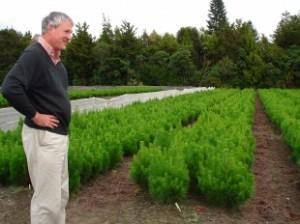Smart science behind mass production of elite carbon-eating pine trees
A Rotorua, New Zealand company has developed the technology to quickly sprout entire forests of superior, carbon-capturing pine trees that have high disease resistance and grow faster and straighter than other trees.
As a result, thanks to years of careful research, Forest Genetics CellFor Ltd is poised for significant growth producing high quality pine trees for forest growers in New Zealand and Australia.
The company’s technology allows the production of millions of genetically superior young radiata pine trees from frozen tissue.
The tree varieties have the potential to capture 25 per cent more carbon than existing radiata pine forests, helping to reduce greenhouse gases and improving environmental sustainability.
The technology was developed with the help of $303,000 in funding from the Foundation for Research, Science and Technology’s TechNZ business investment programme, with the research being completed six months earlier than expected.
Forest Genetics used the TechNZ funding to build on technology developed by Canadian company CellFor Inc, while utilising New Zealand plant propagation expertise from researchers at Scion.
Its potential has been confirmed with forest owners Kaingaroa Timberlands acquiring a significant interest in Forest Genetics, which also recently received investment from the Western Bay of Plenty Business Investor Forum.
TechNZ business manager Shane Stuart says Forest Genetics is a shining example of long term research being applied to market needs.
“Here are scientists with distinguished research careers applying many years of knowledge to providing new solutions to an industry that is vitally important to New Zealand,” he said. “Partnering with an established forestry company completes the mix of skills needed to succeed.”
Timberlands Ltd, which manages Kaingaroa Timberlands forests, will source pine tree cuttings of improved varieties from Forest Genetics and contribute plant propagation expertise to supply other customers as a contract grower to Forest Genetics, as well as other nursery growers in both New Zealand and Australia.
It takes up to nine years to grow tree varieties to a stage of maturity that allows forestry scientists to select those displaying desirable characteristics by which time optimum propagation conditions have passed.
To enable production, tissue cultures of new varieties were created from immature seed extracted from green pine cones and preserved in liquid nitrogen. Sample plants of each new variety were then established in widely-distributed forest trials.
Forest management company Rayonier New Zealand Ltd played an important initial role in supplying seed for the current programme, as well as providing strong support to establishing a comprehensive network of forest trials to test the new varieties. After the premium varieties were identified, the frozen tissue from the selected tree stock was replicated using a process called somatic embryogenesis.
Forest Genetics co-founder and managing director Dr Mike Carson says its Canadian partner has perfected techniques for freezing and later multiplying selected tissue stock into hundreds of thousands of young Loblolly pines.
“What we did in the TechNZ-supported research and development project was adapt those techniques to radiata pine and significantly boost rates of production from each piece of tissue so we have the capability to produce millions of little trees at an affordable price.
“It’s a complex and challenging process. It’s not only about increasing quantities, but also toughening the young trees so they can survive and grow outside laboratory conditions.”
Forest Genetics sold its first, fully tested improved varieties to New Zealand forest growers last year. Production is growing rapidly and the company has already pre-sold hundreds of thousands of plants of tested, improved varieties this year and expects to build up to supplying the Australian and New Zealand markets with several million plants a year within two years.
The company’s other co-founder, Dr Sue Carson, says as well as providing the industry with trees that have high disease resistance and grow faster and straighter, Forest Genetics can custom grow trees with characteristics tailored to individual customers’ needs.
“For example, some of our clients want timber for building houses or other structures and we can supply them with trees specially selected for the stiffness of their wood.
Other clients want trees with enhanced ability to capture carbon and for them we can supply varieties with an especially good growth rate and faster biomass production,” Dr Sue Carson said.
The Carsons are both scientists with international reputations for their work in tree breeding. They founded Forest Genetics in 2002, funding the company themselves until joined by Phil Wells as a partner through the Western Bay of Plenty Business Investor Forum in October last year, and by Kaingaroa Timberlands in April this year.
“The TechNZ funding was crucial,” said Dr Mike Carson. “We had only our own capital and it has been difficult to secure outside investment while forestry has been in the doldrums.”
That’s now changing with the Kaingaroa Timberlands investment opening new opportunities for Forest Genetics.
“We were novices in business when we started Forest Genetics and it’s a very capital hungry business. Our partners have the resources, the big vision and the complementary expertise to take us to the next level.”
Photo Caption:
Mike Carson with very productive mother plants




